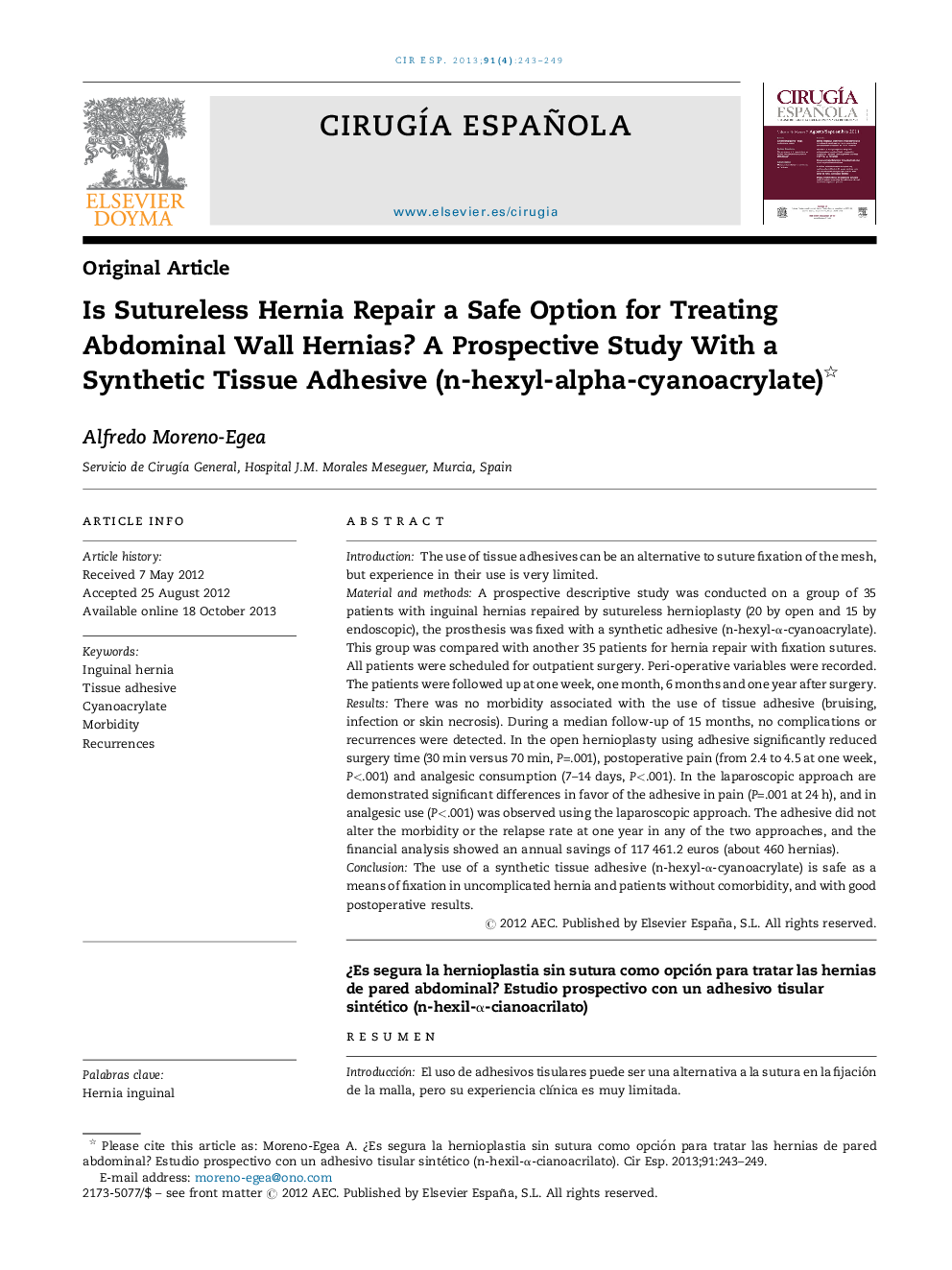| کد مقاله | کد نشریه | سال انتشار | مقاله انگلیسی | نسخه تمام متن |
|---|---|---|---|---|
| 4255250 | 1284433 | 2013 | 7 صفحه PDF | دانلود رایگان |

IntroductionThe use of tissue adhesives can be an alternative to suture fixation of the mesh, but experience in their use is very limited.Material and methodsA prospective descriptive study was conducted on a group of 35 patients with inguinal hernias repaired by sutureless hernioplasty (20 by open and 15 by endoscopic), the prosthesis was fixed with a synthetic adhesive (n-hexyl-α-cyanoacrylate). This group was compared with another 35 patients for hernia repair with fixation sutures. All patients were scheduled for outpatient surgery. Peri-operative variables were recorded. The patients were followed up at one week, one month, 6 months and one year after surgery.ResultsThere was no morbidity associated with the use of tissue adhesive (bruising, infection or skin necrosis). During a median follow-up of 15 months, no complications or recurrences were detected. In the open hernioplasty using adhesive significantly reduced surgery time (30 min versus 70 min, P=.001), postoperative pain (from 2.4 to 4.5 at one week, P<.001) and analgesic consumption (7–14 days, P<.001). In the laparoscopic approach are demonstrated significant differences in favor of the adhesive in pain (P=.001 at 24 h), and in analgesic use (P<.001) was observed using the laparoscopic approach. The adhesive did not alter the morbidity or the relapse rate at one year in any of the two approaches, and the financial analysis showed an annual savings of 117 461.2 euros (about 460 hernias).ConclusionThe use of a synthetic tissue adhesive (n-hexyl-α-cyanoacrylate) is safe as a means of fixation in uncomplicated hernia and patients without comorbidity, and with good postoperative results.
ResumenIntroducciónEl uso de adhesivos tisulares puede ser una alternativa a la sutura en la fijación de la malla, pero su experiencia clínica es muy limitada.Material y métodosEstudio prospectivo y descriptivo en un grupo de 35 pacientes con hernias inguinales operados mediante hernioplastia sin sutura (20 vía abierta y 15 vía endoscópica); la prótesis se fijó con adhesivo sintético (n-hexil-α-cianoacrilato). Este grupo se ha comparado con uno control operado mediante hernioplastia utilizando suturas. Todos los pacientes seguían protocolo de cirugía mayor ambulatoria. Se han registrado variables peri- y postoperatorias. El seguimiento se realizó a la semana, al mes, a los 6 meses y al año.ResultadosNo ha existido morbilidad asociada con el uso del adhesivo tisular. Durante una mediana de 15 meses no se han detectado complicaciones ni recurrencias. En la hernioplastia abierta el uso del adhesivo disminuye de forma significativa el tiempo quirúrgico (30 min versus 62 min, p = 0,001), el dolor postoperatorio (de 2.4 a 4.5 a la semana, p < 0,001) y el consumo de analgésico (de 7 a 14 días, p < 0,001). En el abordaje laparoscópico se demuestran diferencias significativas a favor del adhesivo en el dolor (p = 0,001 a las 24 h) y consumo de analgésicos (p < 0,001). El análisis económico demuestra un ahorro anual de 117.461,2 euros (sobre 460 hernias).ConclusiónEl uso de un adhesivo tisular sintético (n-hexil-α-cianocrilato) es seguro como medio de fijación en las hernioplastias no complejas en pacientes sin comorbilidad, con buenos resultados postoperatorios.
Journal: Cirugía Española (English Edition) - Volume 91, Issue 4, April 2013, Pages 243–249